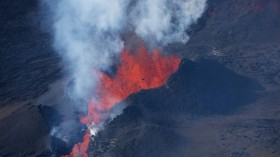Researchers have uncovered what may be the first identified sample of Mars' ancient crust.
Discovered by Bedouin tribesman in the Sahara desert, the specimen bears the nickname Black Beauty -- a title bestowed upon it by researchers.
In order to detect tiny amounts of chemicals in the meteorite, scientists from Florida State University and the National High Magnetic Field Laboratory (MagLab) carried out complex analyses employing a number of mass spectrometers. Large amounts of trace metals like iridium, a hallmark of meteoritic bombardment, revealed the meteorite originated from the Red Planet's highlands.
"This cratered terrain has been long thought to hold the keys to Mars' birth and early childhood," Munir Haumayun said in a statement.
Based on the chemical data encrypted in the pieces of soil found in Black Beauty, the researchers were able to determine the thickness of the Martian crust. Their answers, which matched previous estimates, confirmed that at no point in Mars' early history did it undergo a giant impact that melted the entire planet.
An analysis of the meteorite using a powerful microprobe revealed that certain crystals within the meteorite were 4.4 billion years old.
Published in the journal Nature, the overall report helps to narrow down the age of the crust.
"We now know that Mars had a crust within the first 100 million years of the start of planet building," Haumayun said, "and that Mars' crust formed concurrently with the oldest crusts on Earth and the Moon."
According to Haumayun, the latest study represents just the beginning of the stories the meteorite has yet to tell regarding its home, with further research likely to reveal more clues about Mars' impact history and the makeup of the planet's earliest sediments.
© 2024 NatureWorldNews.com All rights reserved. Do not reproduce without permission.





